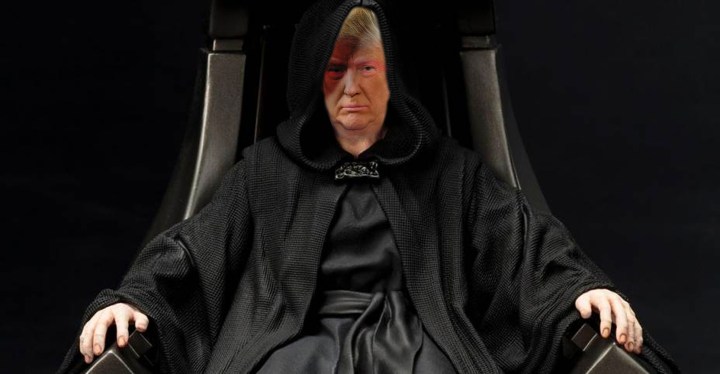DARKNESS OVER WASHINGTON
In America, the Sith Lords are winning

In the US, events are tumbling forward in a great rush, during what ordinarily might be the first days of Washington’s languid summer and escapes to nearby and trendy beach resorts like Rehoboth and Bethany Beach in Delaware. But no, not this time.
A just-scheduled Trump-Putin summit and a likely testy Nato summit, an EU summit focusing primarily on refugees and the growing troubles for German chancellor Angela Merkel, a surprise Supreme Court vacancy, the still-roiling immigration crisis, and a Supreme Court ruling supporting the Trump travel ban v3.0, taken together, virtually guarantee cancelled vacations among the top tiers of government – and the journalists, policy wonks/talking heads, and lobbyists that follow those officials will now be working pretty much straight through to Labour Day, the traditional holiday that marks the end of summer. Shed a tear for them all?
This kind of constant cascade of overlapping news cycles is pure hell on writers and analysts trying to make sense of it all. Just as soon as you think you have fixed on the prime topic for the day to write on and come to grips with its significance and intricacies, along comes another one, and another, and then yet another one. Rather than surrender to the waves, the other approach is to grasp them all and attempt to find the threads between them all – so, here goes.
Midway through Thursday afternoon (South Africa time), there was the sudden and rather startling announcement that US President Donald Trump and Russian President Vladimir Putin would meet in Helsinki on 16 July. Yes, Secretary of State Mike Pompeo was in Moscow, meeting the Russian president and foreign minister, and that could have been a tip-off, maybe. But there was no specific reason to assume that encounter necessarily meant a leaders’ meeting was now imminent.
The timing of it is fascinating, however, and the cynic could be forgiven for wondering if this second meeting was just something tacked on to the journey to the Nato summit in Europe, scheduled just a few days before, in order to give the trip more heft. The big men, sorting out the business of the world, kind of thing. While they were at it, the White House added that in between the two meetings, Trump planned some golf time at his Scottish golf resort. Maybe the Helsinki meeting was just icing on the cake of a golf weekend? Or is that just too cynical? Trump does love his golf clubs, after all.
The real challenge, though, is figuring out what the two leaders will talk about, or, rather, what they will talk about instead of the things they probably should be speaking about. They should be speaking about the Russian seizure of Crimea from Ukraine and the subsequent Russian support for insurgents inside eastern Ukraine that led to Western economic and financial sanctions on Russia; they should be speaking about Russia’s continuing support for Bashar al-Assad’s appalling regime in Syria, in company with Iran and Hezbollah; and while they are at it, they certainly should be speaking about Russian involvement in the 2016 US election and the related hacking of political party servers, as well as rumoured or reported similar activities in other western elections.
The problem, of course, is that given the way this summit was announced, it is unclear exactly why this conversation is now about to take place, or about what they will speak. Clouding the issue further is that on Wednesday, the US president managed yet again to throw cold water on the now generally understood gravity of that electoral interference, saying yet again that the Russians have denied it and he tends to believe them – despite the country’s intelligence community’s consistent view that it all took place. (On Thursday, US National Security Adviser John Bolton – he of that bodacious walrus moustache – told media that Trump would bring up the electoral interference. That will be a very interesting conversational moment: The man who assures the other that Russia didn’t interfere, and the man who says he believes a Pinocchio moment. What in the world will they say to each other?)
Perhaps they will just issue an agreement that Russia should be readmitted to the G7 circle, even though five of the G7 participants (Italy is wavering) believe this is certainly not the time to take such a precipitous step, even if it makes Donald Trump and Vladimir Putin even better buds than they were before. The obvious question is why should they do such a meeting now, given the fact that the reasons for their exclusion from the G7 (or G8, as it was) haven’t changed?
Now this conversation in Helsinki is going to take place just a few days after the annual Nato leaders’ meeting, and the thought of their close conjunction is already giving some a case of diplomatic heebie-jeebies. (The bilateral summit will also be coming just after the EU’s own now-occurring meeting which is largely focused on immigration issues. The result of this meeting is likely to whittle away a real chunk of the influence and power of the German chancellor, given the views among a growing number of the governments of EU members, moving away from any sympathy for refugees and immigrants.)
The last time something similar happened, Trump sulked in his tent Achilles-like, metaphorically speaking, at the G7 meeting, growled at his counterparts, and then sent out his gofers to traduce the Canadian prime minister’s words and intentions. Almost immediately thereafter, Trump went off to Singapore to shower gifts and some mano-a-mano love upon the same man – North Korean leader Kim Jong Un – he had only recently virtually promised to turn into atomic dust, along with the rest of his own rogue nation.
Not surprisingly, some observers have been left less than convinced that the president has a single clue about what he was doing. Of course, all of that was taking place as he wheeled and dealt on threats and then with actions on tariffs against the country’s allies and neighbours, and then gave way to a Chinese company – ZTE – that was a named supplier of electronic components to both North Korea and Iran, both nations under sanction against receiving such items.
Soon after the US-Russian leaders’ summit was announced, the Washington Post reported:
“One senior European diplomat, in a recent conversation, halted mid-sentence to muse about whether it was worse for the two to meet before the Nato summit – when many alliance leaders fear the US president might make big concessions to Putin without input from them – or after, when they would be unable to mop up a mess. Both options are bad, concluded the diplomat, who spoke about the summit on condition of anonymity in advance of the Nato gathering.”
In the meantime, the Trump administration has tied itself into knots over what its actual immigration policies and actions are. Having first announced a “zero tolerance” for illegal migrants from Central America and then having separated thousands of children from parents and guardians on spurious grounds that such actions were required by current law, he then backtracked in response to a firestorm of domestic and international criticism. He then waffled on which legislative proposal he actually supported, left the actual border agents and officials in a state of confusion as to what the current policy was, and created an immigration mess that was generally in worse shape than it had been before the president began his recent efforts.
Along the way, the government has still been unable to reunite most of those thousands of children with their parents. In fact, the government has been unable to clarify to this writer just how many children were still being held, whether they had been separated from parents or taken into custody as individual migrants. Much buck passing on who would know, but no answers. The Congress, moreover, has now found itself unable to reach any sort of consensus on larger or more limited immigration reform measures, almost insuring that the muddle continues unabated.
Then, suddenly, yet another lightning bolt landed. Anthony M Kennedy, a Supreme Court justice appointed by Ronald Reagan three decades ago, announced that he would retire at the end of this just-ended judicial session. Kennedy has been the hinge-point in the current Supreme Court, voting with the four more conservative, rightward-leaning justices on many issues, including the right of corporations to claim that cash contributions to political action committees were the equivalent of free speech and a range of economic questions. But, crucially for many, Kennedy has voted with the other four more liberal, leftward-leaning justices on personal liberty issues such as gay rights and abortion rights concerns. Some commentators have pointed to decisions he wrote on behalf of majority opinions that gay rights were real rights would be his real judicial legacy.
However, this sudden vacancy has given Donald Trump an opportunity to nominate a successor to Kennedy, and Trump, very quick off the mark, has said he will appoint someone at least as conservative as Kennedy was in his most conservative moments, and that he looks forward to the nominee being confirmed by the Senate swiftly for this lifetime position.
The appointment of an avowedly conservative advocate would substantially alter the precarious balance between the two camps on the court, tipping the weight away from civil liberties and some hard-won civil rights, in the fears of a growing number of civil and health rights organisations. The ideologically divided court with Kennedy as swing vote on upholding the Trump anti-Muslim visa ban V.3 would now become a slam dunk for such issues in the future. It will not be pretty.
This nomination process is going to be increasingly tangled with the US midterm election. Under the US Constitution, the Senate must vote to confirm (or reject) nominations of Supreme Court justices. The Senate Republican majority leader, Mitch McConnell, has promised to move quickly on the upcoming nomination, even though he had led the charge to prevent consideration of Barack Obama’s final nominee to the court on the grounds that such votes shouldn’t take place in an election year.
McConnell has now fudged that rock-hard position, saying that such a refusal would only apply in presidential election years, not midterm ones. Oh, right. But given the narrow Republican majority, the real battle will be whether or not Democrats can peel off two or three Republican senators to prevent confirmation, as well as if they can keep their own Democratic caucus 100% in line to vote “nay”.
And so, the question will become whether or not people like John McCain, Jeff Flake or Susan Collins – for various reasons – can be convinced to join forces in opposition. And similarly, Republicans will be aiming to round up a couple of Democratic senators up for re-election in states that tend to lean Republican who would be subject to a withering campaign against them at the national level, with millions of campaign dollars thrown into the battle. (The traditional weapon in the Senate, the filibuster, a procedure that requires 60 votes in favour of ending debate, no longer applies to votes on judicial nominees.)
All of these issues, the upcoming nomination for the Supreme Court, the various summits, the immigration mess, and the general demeanour of the president will be major parts of the upcoming election – and they will, all of them, become intertwined as the campaign heats up, following the Labour Day holiday on the first Monday of September. And just imagine how it will play out if the supposed victory at the Singapore summit with President Kim begins to fray; the president gives policy gifts to the Russian president, and the immigration issue continues to rumble on without closure. It is going to be a very nasty campaign this year. DM



















